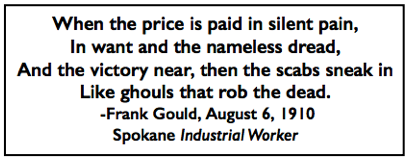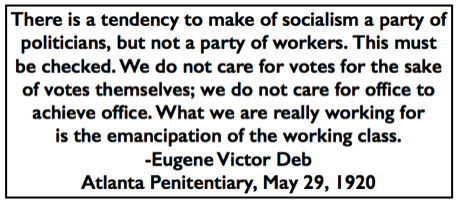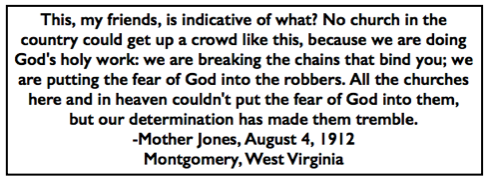 ———-
———-
Hellraisers Journal – Thursday August 11, 1910
“And the victory near, then the scabs sneak in…” The Scab” by Frank Gould
From the Spokane Industrial Worker of August 6, 1910:
 ———-
———-
Hellraisers Journal – Thursday August 11, 1910
“And the victory near, then the scabs sneak in…” The Scab” by Frank Gould
From the Spokane Industrial Worker of August 6, 1910:
 ———-
———-
Hellraisers Journal – Wednesday August 10, 1910
Andrea Villarreal, Mexican Revolutionary -by L. Gutierrez De Lara
From The Progressive Woman of August 1910:
ANDREA VILLARREAL.
—–L. GUTIERREZ DE LARA.
—–
When Antonio Villarreal joined the revolutionary party of Mexico about ten years ago, his sister Andrea took a very active part in the movement writing for the different revolutionary newspapers of Mexico. One day Antonio was attacked by a paid assassin and in defending himself he killed his assailant. He went to jail, but his sister took his place in the movement.
When Antonio was released they understood that they could no longer live in Mexico. All the members of the revolutionary junta were compelled to come to the states, establishing their headquarters in St. Louis, Mo.
In the meantime Andrea was the very soul of the junta. She, with her sister, Teresa, went to the university to study sociology for a very short time. Meanwhile the members of the junta were hounded, kidnaped, incarcerated, their printing establishment looted, and in all these hard times Teresa, taking advantage of the fact that she was a woman, was able to be the main supporter of the movement while the others were dispersed, waiting for the time to get together again.
Finally the persecution was so strong that they had to leave St. Louis and go to Canada. They then went to El Paso and finally to Los Angeles where they were arrested. Teresa was in St. Louis, but one day when she was out of the house on her return she found that everything was looted.
The men were then in the jail in Los Angeles and the powerful agents of Diaz in the United States completely paralyzed the movement, but Teresa traveled from place to place with complete faith in the success of the Cause.
Seeing the Mexicans scattered all over the United States gave courage to them to struggle for the defeated cause. About a year ago she was able to meet her brother Antonio while he was being taken from Yuma, Ariz., to Florence. Her first words were: “We have not lost everything and our souls and our courage are stronger than ever.”
She bid goodbye to her brother, and then went to Arizona and Texas for the cause of the workers.
[Emphasis added.]
 ———-
———-
Hellraisers Journal – Monday August 9, 1920
“The Garland for Debs” -a Poem by Louis Untermeyer
From the New York Liberator of August 1920:
 ———-
———-
Hellraisers Journal – Monday August 8, 1910
The Employer-The Unemployed-The Man on the Job
From the Spokane Industrial Worker of August 6, 1910:
[Text:]
The boss works not at all. The unemployed works not at all. The worker works 10 hours per day. The worker produces a luxurious living for the boss, an existence for the unemployed, and a bare living for himself. What’s the matter with letting the unemployed go to work, making the boss go to work, and having the worker working one-third as long? If we organize and cut the working hours the boss will have to hire the unemployed. That will reduce competition among the workers for a job and give them power to later force the boss to cease being a boss and become a worker.
 ———-
———-
Hellraisers Journal -Tuesday August 7, 1900
Eugene Debs Will Represent International Class-Conscious Socialism
From The Scranton Republican of August 6, 1900:
—–
SPRINGFIELD, Mass., Aug. 5.-Eugene V. Debs, the presidential nominee of the Socialist Democratic party, has sent his letter of acceptance to William Bubscher, national secretary of the party in this city. Mr. Debs writes his letter from Terre Haute, Ind., under date of July 31,
 ———-
———-
Hellraisers Journal – Friday August 6, 1920
Atlanta Penitentiary – Debs Working for Release of All Class-War Prisoners
From The Butte Daily Bulletin of August 4, 1920:
DEBS STILL WORKING FOR RELEASE OF FELLOW MEN
—–(Special United Press Wire.)
New York, Aug. 4.-Added impetus to the movement to secure the release of all political and class war prisoners from the federal and state prisons has been noted here since the receipt of word from Eugene V. Debs, who requested that efforts of individuals and organizations in his behalf alone be ceased and energies turned to the release of all.
Debs, who is the nominee of the Socialist party for president, is undergoing imprisonment at Atlanta federal penitentiary for his struggles in behalf of the workers.
———-
 ———-
———-
Hellraisers Journal – Thursday August 5, 1920
Robert Minor on the Battle at Matewan Between Citizens and Gunthugs
From the New York Liberator of August 1920:
IV of IV
About half past five in the afternoon, Chief Hatfield was standing around when a boy runs in, saying, “The thugs is come to town!”
Sid Hatfield walked out quick to the back street and there was Albert and Lee Felts and C. B. Cunningham, the gunman that was known for being quick on the draw. And standing back of them was ten Baldwin-Felts men. Then there was a dummy that had been hanging around town all day without any gun and not letting on he was a Baldwin-Felts man.
Sid walked up to Albert Felts and says, “I’ve got a warrant for you.”
Albert sort of grinned and says, “I’ll return the compliment; I’ve got a warrant for you.” All of the thugs kind of shuffled around on one foot and then the other, and pretty soon Sid was surrounded. Sid looked around and seen there was no friends near, only Isaac Brewer, the town policeman, was standing quiet.
Albert Felts says to Sid, “We’ll take you up to Bluefield on the train that’s due in seven minutes.” Sid says nothing and just smiles. And Albert says, “We’ll ride on the Pullman, Sid,” and walks Sid over to near the place where the end of the train will stop, and says, “Is this where the Pullman stops?” and Sid said “Yes.”
Sid knew it wasn’t no Pullman ride they planned for him, but that they wanted to be near the end of the train to jump on when they got through with him. The train only stops a minute.
They stood around waiting, and Sid kind of edged back towards the town-side of the street, near the back door of Chambers’ hardware store. Albert Felts and Cunningham the gunman kept close to, Sid, while Lee Felts and the ten other gunmen was standing back a little piece, nearer the railroad track. Albert says again that the train will be in in seven minutes and they would take the Pullman.
 ———-
———-
Hellraisers Journal – Wednesday August 4, 1920
Robert Minor Arrives in Matewan, Meets Smilin’ Sid Hatfield
From the New York Liberator of August 1920:
III of IV
From the five o’clock morning train I alighted at the little. double row of stores and houses that are called Matewan, and before the town was astir I took a walk to the middle of the bridge over Tug River. There boy asked me, “Is it true they got two more thugs up the road last night?” I turned back to talk with the boy, and then I saw a man on a bench before a building on which was scrawled in red letters, “U. M. W. of A.” This man’s face limbered up when I told him I was a friend of Fred Mooney, Secretary of the Mine Workers at Charleston, and he said, “I sized you up as a friend of the Union and I’m glad you didn’t go further across the bridge, because you might have got shot. That is Pike County, over there.”
Toward nine o’clock I saw, standing near the railroad track, a middle-sized man of age about twenty-two. Although this man was alone, he was continually smiling. When he moved, his vest was displaced and exposed two Smith & Wesson revolvers, one stuck into each side of his trousers; A coal digger introduced him as Chief of Police Sid Hatfield.
 ———-
———-
Hellraisers Journal – Tuesday August 3, 1920
Robert Minor Reports on Efforts to Organize Mingo County
From the New York Liberator of August 1920:
II of IV
When the United States entered the World War and the getting-out of coal became important, the United Mine Workers of District 17, comprising the southern half of West Virginia, grew in membership from five thousand to forty-two thousand. Young and energetic leaders developed out of the coal pits, advances were made in pay, and the workday was reduced from nine to eight hours.
In 1919, Unionism knocked hard on Old Man Baldwin’s door, and even slipped her foot over his sill. Unionism entered Logan County. Logan County is the “fortified town” of Don Chafin. Old Man Baldwin ruled Mercer, McDowell, Wyoming and Mingo Counties from his headquarters at Bluefield, but the County of Logan is held by his ally, Don Chafin, officially known as County Clerk.
 ———-
———-
Hellraisers Journal – Monday August 2, 1920
Robert Minor Travels to West Virginia to Report on Coalfield Wars
From the New York Liberator of August 1920:
I of IV
As the train from Charlottesville ran through the Blue Ridge Mountains, a Negro looked out of the window, arose and walked from the stuffy compartment “for colored people” into a more comfortable car marked “for whites.” From that I knew the train had passed into West Virginia. The Negro sat down facing a weatherbeaten man with a white mustache and a broad-brimmed hat. The white man’s face did not change expression at the Negro’s entrance, and from that I knew that the white man was a mountaineer of the West and not an inhabitant of Old Virginia.
From Chesapeake Bay, across the Blue Ridge Mountains and away up around the southwest corner o£ Pennsylvania, used to extend the domain of Old Virginia. But the rich planters of the eastern valleys went to war against the Union, and the “po’ white” men hoeing their corn alone on the mountains and not owning any n——, refused to follow. The new State of West Virginia was made of these soft green mountains and lonely cabins and corn patches.
For another generation the people of the mountains hoed their corn. Then somebody discovered that the green-covered mountains were made of coal. The railroads began to scratch their way through the green, and to nose out the great black insides that were worth more than the cabins and corn patches. Men from Northern cities took part in West Virginia affairs and soon could prove with legal papers that they owned the black contents of the mountains and the green surface, too.
Many mountain families quit hoeing corn. They settled near the coal pits where regular wages and store clothes seemed to offer more of a living. The population passed from the outside of the mountains to the inside of them, and the grip of the men with the title deeds dosed down hard upon all.